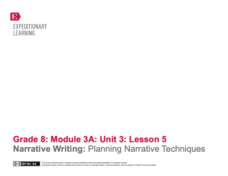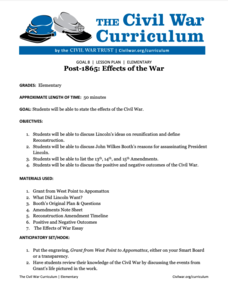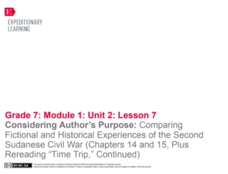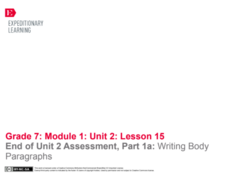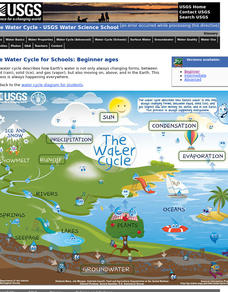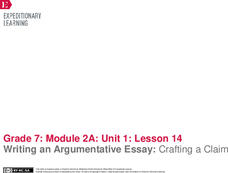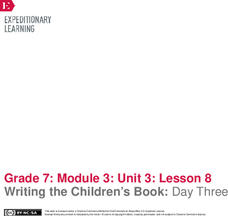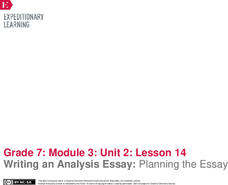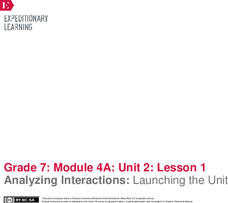EngageNY
Narrative Writing: Planning Narrative Techniques
It's all in the technique. Scholars revisit the model narrative they covered in lesson four to analyze the author's writing techniques. Readers compare techniques they spot in the narrative to those in the essay rubric. They then work to...
EngageNY
Adding to Cascading Consequences and Stakeholders: Industrial Food Chain
Young researchers create a class Cascading Consequences chart to see how the industrial food chain affects people, animals, and the environment. They also work in teams to complete a Stakeholders chart for the industrial food chain model...
EngageNY
Adding to Cascading Consequences and Stakeholders: Hunter-Gatherer Food Chain
Could the hunter-gatherer food chain feed everyone in the United States? To consider the question, pupils use their research and add to the Cascading Consequences chart based on Michael Pollan's hunter-gatherer food chain from The...
American Battlefield Trust
Post-1865: Effects of the War
What did Lincoln want? Historians still debate this question, and perhaps people will never fully know. Class members examine the legacies of the war, including the Thirteenth, Fourteenth, and Fifteenth Amendments. The lesson plan also...
EngageNY
Informational Essay Planning: Studying the Essay Prompt and Gathering Evidence
Using a Gathering Evidence note-catcher, readers record evidence in A Mighty Long Way and Little Rock Girl 1957. They then use the evidence to analyze and discuss different mediums with their peers. Lastly, they look at a writing prompt...
EngageNY
End of Unit 2 Assessment, Part 1: Best First Draft of an Informational Essay
Writers work to create drafts of their end-of-unit assessments relating to A Mighty Long Way and Little Rock Girl 1957. Using computers to create the first versions of their essays, writers emphasize ideas and evidence before focusing...
EngageNY
Reading the Map and Beginning Chapter 1
Seventh graders begin their study of Linda Sue Park's A Long Walk to Water by discussing scenarios related to the novel with a partner. The discussion topics invite pupils to consider how various factors, such as war and poverty,...
US Department of Homeland Security
Psychological First Aide (PFA) for Students and Teachers
Listen, protect, connect! Using the resource, teachers learn how psychological first aid helps scholars adjust after a crisis or school emergency. They discover how to observe changes in pupils' school performance, listen and offer...
EngageNY
Comparing Historical and Fictional Accounts: Second Sudanese Civil War (Chapters 14 and 15, Plus Rereading “Time Trip”)
Let's compare! One pair of scholars adds to the Salva/Nya anchor chart by gathering evidence about the characters from chapters 14 and 15 of A Long Walk to Water. The rest of the class pairs work on adding to the Survival anchor chart....
EngageNY
End of Unit 2 Assessment, Part 1a: Writing Body Paragraphs
It is not what you say but how you say it. Class members prepare for writing their A Long Walk to Water essays by analyzing row four in the writing rubric. Learners discuss the words used and talk about the importance of correct grammar...
US Geological Survey
The Water Cycle for Schools: Beginner Ages
Explore a day in the life of a water droplet. An interactive infographic helps scholars learn how water cycles work from precipitation all the way around to condensation. Learners hover over each step of the cycle to read more as they...
Missouri Department of Elementary
Goldilocks Revisited
After a read-aloud of the story Goldielocks and the Three Bears, scholars gather into small groups to answer a series of questions. Peers examine the idea of smart decisions and identify three feelings of characters alongside three...
K20 LEARN
Government and Your Right To Vote: Voting Rights In America
Gaining voting rights was difficult over the course of decades, but the debate over who should actually be allowed to cast a ballot remains. Scholars explore the history of the struggle, including the fifteenth and nineteenth amendments,...
K20 LEARN
Government Power: Do the Actions of Government Effect Me?
What does the government have to do with getting a driver's license? Including the calorie count for a meal on a restaurant menu? By discussing these kinds of questions and researching how concepts behind federal, state, and local...
EngageNY
Writing an Argumentative Essay: Crafting a Claim
As scholars prepare to craft their essays based on Katherine Paterson's Lyddie, they learn about using compelling reasons in their writing. Next, they develop a claim about whether Lyddie should sign a petition to speak out against...
American Museum of Natural History
DNA Detective
DNA is like the fingerprint of genetics. A quick lesson introduces the topic of DNA sequences with a mystery about an endangered species. The lesson shows how DNA extraction, replication, and sequencing often provide undeniable evidence...
EngageNY
Individual Research
Seventh graders get the option of choosing their own text from a selection to read and gather more information as part of their research. Learners discuss the difference in reading for research and reading for pleasure. They also begin...
EngageNY
Writing the Children’s Book: Day Three
Illustrations are a key feature of children's books. Using the resource, pupils learn about adding illustrations to their children's books. Next, as they complete their storyboards and work on their second drafts, they consider their...
EngageNY
Analyzing Douglass’s Purpose: Learning to Read
Three for three. Groups of three complete Analysis note catchers that cover excerpt three of Narrative of the Life of Frederick Douglass. Before beginning, learners discuss group work by looking at the excerpt analysis role document and...
EngageNY
Writing an Analysis Essay: Planning the Essay
Writers work on creating a plan for their end-of-unit essay of Narrative of the Life of Frederick Douglass using a Frederick Douglass Essay Planner to help guide their thought process. They then regroup as a class to discuss the use of...
American Museum of Natural History
What's the Big Deal About Paleontology?
Paleontologists could be considered detectives of the past. A quick online lesson describes the science of paleontology and the importance of fossils. Young scientists read about how paleontologists analyze the features of fossils to...
Facing History and Ourselves
Protesting Discrimination in Bristol
Using the Bristol Bus Boycott as a case study, class members examine the strategies and levels of power protesters used to effect change. The two-day instructional activity concludes with individuals reflecting on the actions they might...
EngageNY
Mid-Unit Assessment: Drafting the Position Paper
Halftime! Scholars write the rough draft of their position papers to serve as the mid-unit assessment. At the end of the sessions, pupils turn in their rough draft essays and work on independent reading.
EngageNY
Analyzing Interactions: Launching the Unit
How much screen time is too much? Scholars explore the question as they consider whether the American Academy of Pediatrics (AAP) should increase its screen time recommendations. With group discussions, close readings, and a jigsaw...
Other popular searches
- Sense Organs
- Cells, Tissue, Organs
- Internal Organs
- Major Organs
- Function of the Organs
- Cells Tissue Organs
- Reproductive Organs
- Plant Organs
- Digestive Organs
- Animal Organs
- Picture of Sense Organs
- Internal Bodily Organs


